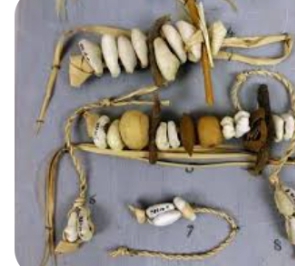Aroko: Non-Verbal Communication in Yoruba Culture
Aroko: Non-Verbal Communication in Yoruba Culture

In Yoruba culture, AROKO serves as a unique non-verbal communication system. Each item carries specific meanings and messages.
Broom (ẸFẸ): Sending a broom indicates a desire to end a relationship or that you no longer wish to see someone in your home.
Chewing Stick (PÁKÒ): Receiving a chewing stick from someone of the opposite sex signifies “I LOVE YOU.”
Orange (ỌSÀN): If you receive an orange, possibly delivered by someone else, it conveys that the sender is pleased with you or expresses affection.
Comb (ÌYARUN/ÒÒYÀ): Typically used to untangle hair, a comb sent to someone signifies separation or the end of a friendship or romantic relationship.
Mat (ẸNÍ): Receiving a raffia mat, especially of the ore type, indicates that someone in the recipient’s household is unwell and losing weight.
Baby Cloth (Ọ̀JÁ/GBÀJÁ): If you receive a piece of cloth used for wrapping a baby, it means the pregnant woman you left behind has successfully given birth.
Empty Calabash (IGBÁ ÒFÌFO): When a king receives an empty calabash or similar items, it suggests that the people are displeased with him, implying he should take drastic actions.
Cowrie Shells (OWÓ ẸYỌ): Cowrie shells hold various meanings in AROKO, influenced by their arrangement. A shell with a string indicates bad news, while two shells tied facing each other signify agreement and harmony. Conversely, shells tied back to back represent discord or rejection.
Number Three: In Yoruba tradition, giving items in threes is avoided due to its confusing nature. However, six cowries tied in pairs express emotions and symbolize longing, conveying “I MISS YOU.”
Flywhisk (ÌRÙKẸ̀RẸ̀): Sending a flywhisk and cowrie shells between monarchs signifies a request for unity or a farewell.
Gun or Gunpowder (ÌBỌN/Ẹ̀TÙ): This symbolizes a declaration of conflict or war, warning the receiving town to prepare for potential battles.
Salt (IYỌ̀): In contrast to gunpowder, salt signifies peace and solidarity. Sending both sword and salt indicates a choice between war and peace in an unresolved situation.
These items reveal the rich tapestry of Yoruba communication and cultural expression.
TRENDING SONGS
 Ahmad Yerima: Naval Officer to Face No Sanctions After Clash with Wike – Matawalle
Ahmad Yerima: Naval Officer to Face No Sanctions After Clash with Wike – Matawalle
 Trending Video: Muslim Man Joins Wife in Hallelujah Challenge ‘Dress Like Your Miracle’ Night
Trending Video: Muslim Man Joins Wife in Hallelujah Challenge ‘Dress Like Your Miracle’ Night
 Woman Seeks Advice as Late Brother’s Wife Refuses to Mourn Him Following His Death With Alleged Mistress
Woman Seeks Advice as Late Brother’s Wife Refuses to Mourn Him Following His Death With Alleged Mistress
 Nobody Cares About Fine Girls In The UK, I Miss Nigeria — Nigerian Lady Laments
Nobody Cares About Fine Girls In The UK, I Miss Nigeria — Nigerian Lady Laments
 Wedding Called Off: How Lady Cancels Wedding After Finding Out Finance’s Affairs With Her Bestie
Wedding Called Off: How Lady Cancels Wedding After Finding Out Finance’s Affairs With Her Bestie
 Heartbreak in Ikeja: Lady Weeps After Fufu Found in New Phone Package
Heartbreak in Ikeja: Lady Weeps After Fufu Found in New Phone Package
 Twist of Fate: Man Who Questioned Phyna’s ₦1Billion Demand Mourns Brother in Dangote Truck Crash
Twist of Fate: Man Who Questioned Phyna’s ₦1Billion Demand Mourns Brother in Dangote Truck Crash
 Tragedy in Enugu: Dangote Truck Claims Lives of Family of Five
Tragedy in Enugu: Dangote Truck Claims Lives of Family of Five
 Bangkok Crackdown: Nigerian-Thai Couple in Police Net Over Drug Trafficking
Bangkok Crackdown: Nigerian-Thai Couple in Police Net Over Drug Trafficking
 Family Rift: Reno Omokri’s Ex-Wife Says He Deserted Their Special Needs Son
Family Rift: Reno Omokri’s Ex-Wife Says He Deserted Their Special Needs Son
Share this post with your friends on ![]()













